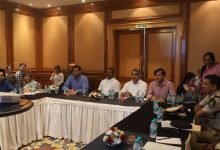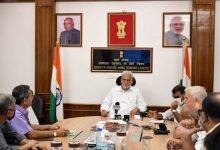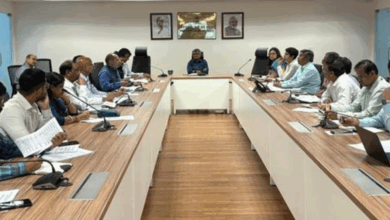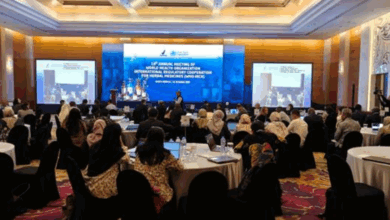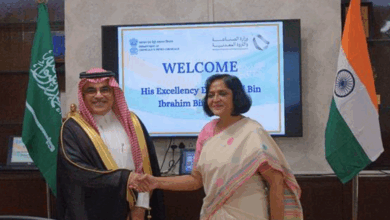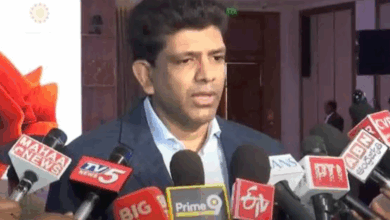22nd National Fish Farmers Day celebrated
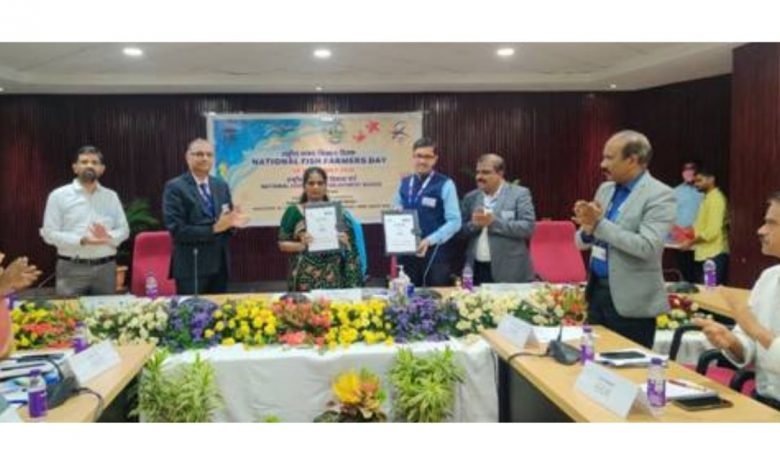
Union Minister for Fisheries, Animal Husbandry and Dairying, Dr Sanjeev Kumar Balyan and Dr L. Murugan address the event
National Fisheries Development Board, Union Ministry of Fisheries, Animal Husbandry and Dairying, celebrated the 22ndNational Fish Farmers Day today in a hybrid mode at NFDB Hyderabad. The program was graced virtually by Dr Sanjeev Kumar Balyan, Union Minister of State for Fisheries, Animal Husbandry & Dairying and Dr L. Murugan, Union Minister of State for Fisheries, Animal Husbandry and Dairying.
More than 1000 fish farmers, aquapreneurs & fisher folks, professionals, officials and scientists from across the nation participated in the event. During the event, 4 posters as outreach on Domestic Fish Consumption and sustainable production were released. Posters on“Fish for Motherhood” & “Fish Nutrients and their Wellness Benefits” were released by Dr Sanjeev Kumar Balyan and posters on “Sustainable Fishing Practices” & “State Fishes of India” were released by Dr.L. Murugan.
Addressing the event, Dr L. Murugansaid that the country stands second in fish production through aquaculture. This is due to the contribution made by the scientists through the development of breeding technologies for different fish species and the culture of improved fish varieties. He added that the Hon’ble Prime Minister is promoting locals vocals. The country’s fisheries exports were not affected even during the Covid pandemic, due to various measures taken by the Government. He said that the country has vast untapped fisheries potential.
Realising the potential of the fisheries sector, the Government has launched the PMMSY, FIDF and KCC for benefit of the fishers and fish farmers in the country. To promote seaweed cultivation the Government of India sanctioned Seaweed Park in Tamil Nadu and fishing harbours are being modernized across the country, the Minister highlighted.
Ministers release posters on Domestic Fish Consumption and sustainable production
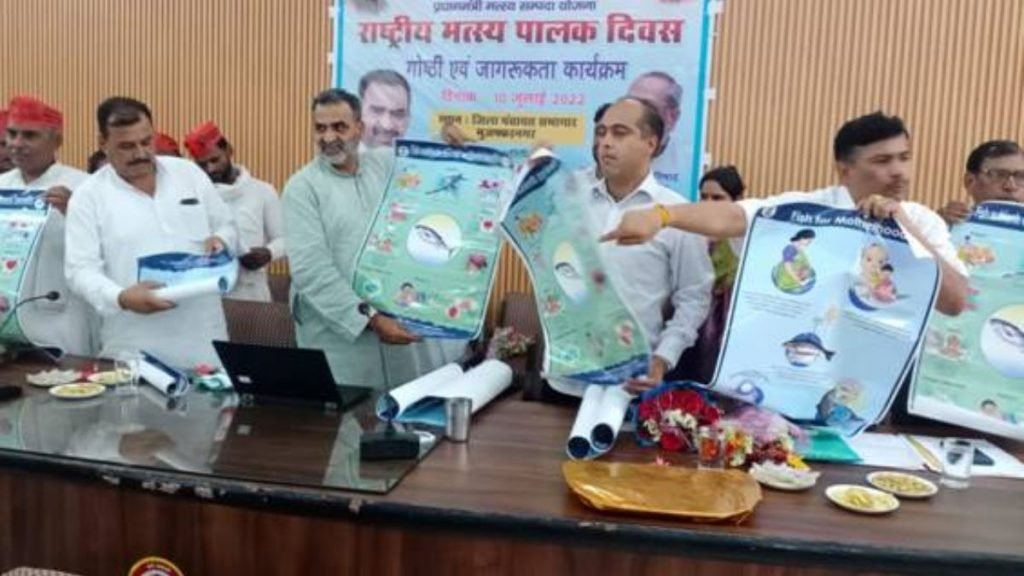
Dr Sanjeev Kumar Balyan in his address said that the government is implementing the flagship scheme of PMMSY for benefit of fishers and fish farmers in the country with the highest outlay of Rs.20050 crore. He said that farmers should utilize the scheme, increase fish production and productivity, and improve their socio-economic status. There is a need to increase awareness of the health benefits of fish among the consumers and NFDB has developed nice posters on this aspect.
Shri Jatindra Nath Swain, Secretary Department of Fisheries launched the NFDB Lab project on “Assessment of pathogenic microorganisms along with nutrient and residual contaminant profiling in fish and aqua Feeds”. On this occasion, NFDB and State Bank of India signed MOU to facilitate FIDF & Entrepreneur Models scheme.
Shri Sagar Mehra, Joint Secretary (Inland Fisheries) highlighted that there is a steady increase in the share of fisheries in the country’s GDP. About 2.8 crore people are dependent on fisheries in the country. During the program, the dignitaries interacted with progressive fish farmers under the PMMSY scheme. Fish farmers availing quality seed from NFFBB gave feedback on the growth performance of improved seed varieties. North East fish farmers shared their prospects in the fisheries sector.
Nearly 30 States/UTs participated virtually in groups with more than 500 participants.
National Fish Farmer’s Day is celebrated on 10th July every year to demonstrate solidarity with all fisher folk, fish farmers and concerned stakeholders throughout the country. Every year, this annual event is celebrated to commemorate Professor Dr Hiralal Chaudhury and his colleague Dr Alikunhi for their contribution to achieving the successful induced breeding of major carps on 10th July 1957 at Angul in Odisha for the first time in the country through the administration of carp pituitary hormone extract in the breeding of major carps.
Interaction with progressive fish farmers under the PMMSY scheme organized
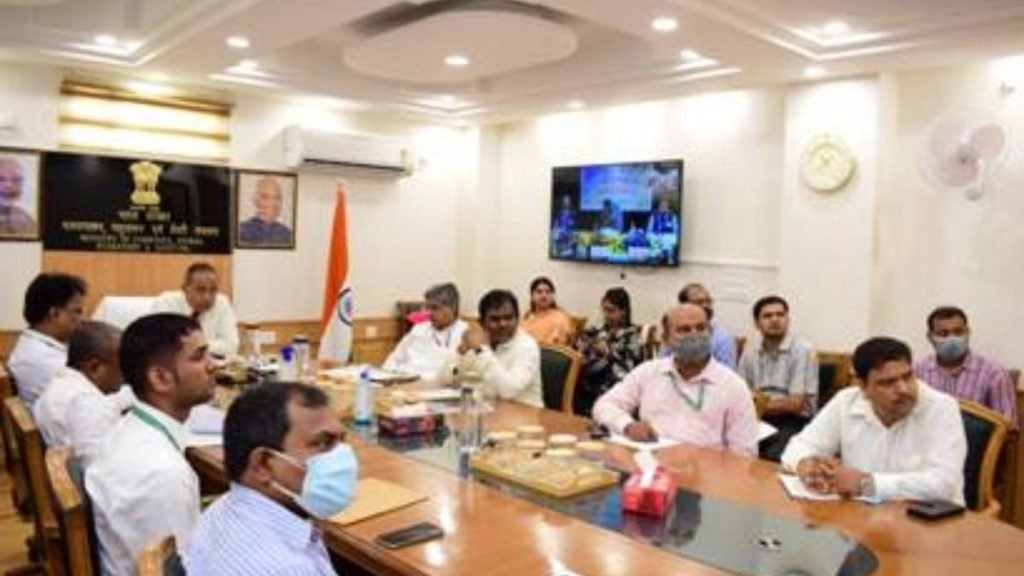
The technology was later standardized and fine-tuned by developing synthetic hormones for quality seed production across the country. This pioneering work of induced breeding over the years has transformed the growth of the aquaculture sector from traditional to intensive aquaculture practices and led to the success of the modern aquaculture industry.
The Government of India is at the forefront of transforming the fisheries sector and bringing about economic revolution through the Blue Revolution in the country. The sector envisioned to increase the farmers’ income through enhancement of production and productivity, improving the quality and reduction of waste.
Taking into account the Centrally Sponsored Scheme “Blue Revolution” – Integrated Development and Management of Fisheries which was launched in 2016 had made vital contributions towards the development of the sector and in 2020, the Hon’ble Prime Minister launched the “Pradhan Mantri Matsya Sampada Yojana (PMMSY) with a budget of over Rs. 20,050 crores for a period of five years.
PMMSY aims to achieve fish production of 22 MMT from the current 13.76 MMT by 2024-25 and to create an additional employment opportunity for about 55 lakh people through this sector. Also, the scheme provides thrust for infusing new and emerging technologies in fisheries and aquaculture while creating a conducive environment for private sector participation, development of entrepreneurship, business models, promotion of ease of doing business, innovations and innovative project activities including start-ups, incubators etc.
30 States and UTs participate
Meanwhile, the Fisheries and Aquaculture Infrastructure Development Fund (FIDF) scheme started in 2018-19 with a budget of Rs. 7,522.48 crores, which is also continuing presently. FIDF will specifically cater to the creation of fisheries infrastructure facilities both in marine and inland fisheries sectors to augment the fish production to achieve the target. Projects under the FIDF is eligible for loan up to 80% of the estimated/actual project cost.
Disclaimer : This is an official press release by PIB.

